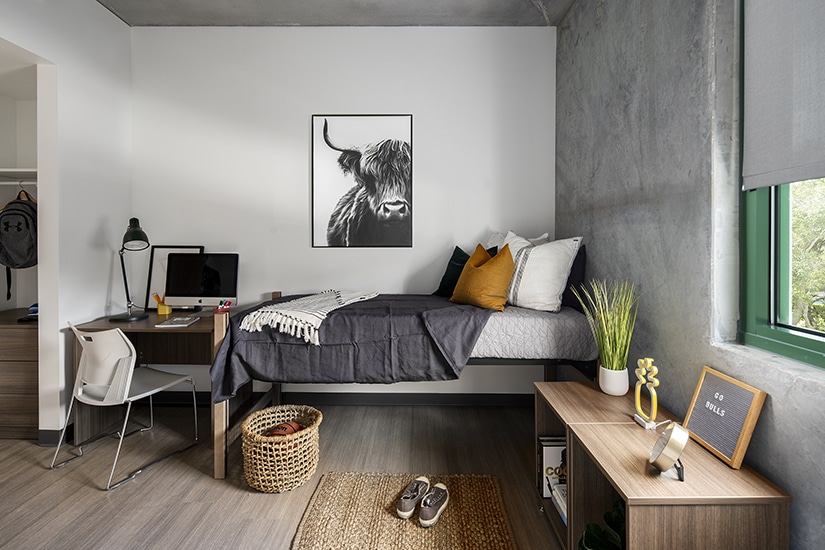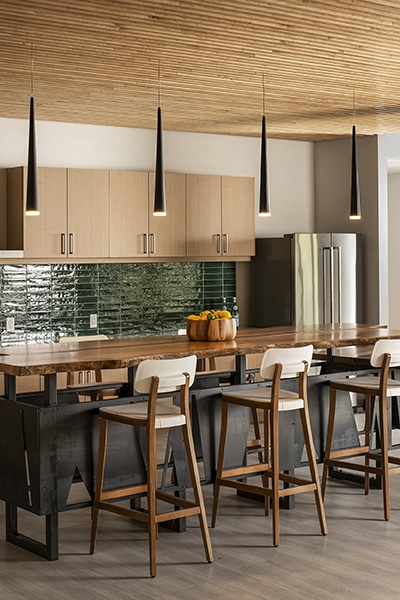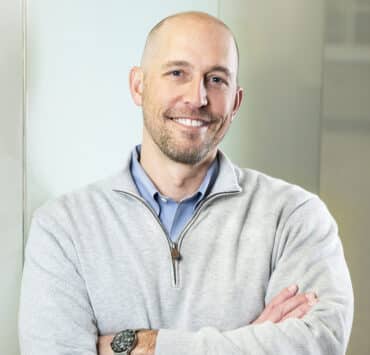| |
For Ed Lewis, returning to England and driving across the picturesque roads in the southeastern part of his country brings the first part of his career to life. As he enters Suffolk county, he passes the traditional thatched-roof oak framed homes he helped renovate in his early days. In nearby Essex county, he sees the mixed-use commercial units and small schools he coordinated as a contracts manager. Finally, in Cambridgeshire, he encounters the large sustainable community he managed just before leaving his homeland. “It’s rewarding to pass by these quality projects and realize these homes and businesses will be there for generations to come,” he says.

Lewis developed a passion for construction management anchored by quality design and build principles, and he’s imported that UK mindset to the United States. He came to the Sunshine State in 2016 as the campus project manager and was promoted in 2019 to assistant director of planning and construction to help the University of South Florida St. Petersburg campus (USF) build spaces where students can thrive.
“This role offered me the chance to build a different kind of legacy,” Lewis says. “What I work on now will impact students for generations to come and become their stepping-stones to a new phase in life.”
The public research university on the state’s west coast traces its origins back to 1956. Until recently, it operated as three separately accredited institutions with campuses in Tampa, Sarasota-Manatee, and St. Petersburg. In 2018, Florida lawmakers passed legislation requiring USF to consolidate under a single accreditation.
Consolidation will help faculty and staff collaborate, provide more opportunities to students, and strengthen USF’s standing in the community. Lewis, who is based on USF’s St. Petersburg campus, is working with key stakeholders to execute a complicated, multiyear campus master plan designed to take USF into the future.
The detailed plan outlines goals, objectives, and policies regarding land use, transportation, facilities, and sustainability. While some organizations would have turned to outside consultants, USF chose to handle the plan internally with the president and provosts, setting the tone. Lewis, who solicits input from student groups, community organizations, deans, professors, board members, trustees, and others, views himself as a facilitator. “This large document will guide how our system evolves and grows as we define what and who we want to become,” he says. “Everyone needs to participate, and everyone needs to have a voice.”

These conversations brought issues like diversity, inclusion, and sustainability to the forefront. Lewis acts as a liaison to a large and active student advocacy group focused on sustainability. Since 2012, the group has brought cool roofs, a solar-powered mini-grid, LED lighting, electric vehicle charging stations, and other energy-efficient projects to campus through a Student Green Energy Fund. And while USF has campus recycling programs and LEED buildings, Lewis says sustainability is about more than certifications—it’s about the opportunity to improve our environment. He gives students active roles in generating preconstruction sustainability reports and has helped some individuals pursue LEED AP credentials.
In 2020, Lewis’s team completed and opened a new residence hall in St. Petersburg. The 125,000-square-foot building is a transformational structure, as it is visible from the highway and increases student capacity by nearly 70 percent. “We want to educate at the highest level and create a real sense of community, and that means we have to have a place for students to live, interact, and collaborate,” Lewis explains. The $33 million building, known as Osprey Suites, has 375 beds through its five residential floors and a complete dining facility.

Although COVID-19 had the potential to delay a fundamental renovation at Davis Hall, the project was completed on schedule in the spring of 2021. USF fully updated the primary academic building at the St. Petersburg campus, providing important modern features. Lewis and his team worked with tech vendors to soundproof classrooms. They installed advanced AV equipment that enables students, faculty, and staff to interact across multiple campuses. The “future-proofed” space is prewired and lined with conduits so the facilities department can provide updates as the use of technology in the classroom continues to evolve.

While Lewis is helping bring modern touches to USF, he’s also relying on his heritage to help the university preserve a piece of history. In 2020, USF received a grant to take the first steps towards restoring the John C. Williams House, a Victorian-era structure built in 1891 and brought to campus in the late 1990s. A master preservation plan will help restore the landmark Queen Anne home, whose features include beautiful stained-glass windows and an octagonal turret, to its original glory.
Lewis’s longstanding commitment to quality unites projects like Williams House and the larger campus master plan. “We want our work to stand the test of time,” he says. “Everything we do is designed to provide opportunity and benefit the students that come to our campus every day.” In doing so, Lewis ensures the legacy he started in the UK continues in the USA.
Willis Smith Construction congratulates Edward Lewis on his team’s many accomplishments while servicing the facility and construction needs of the University of South Florida–St. Petersburg campus. Ed’s attention to detail and collaborative ways of managing the entire team which includes department heads, executive members, and students contribute to much of the success that is shown on campus. Willis Smith Construction has enjoyed this relationship with Edward Lewis and the University of South Florida for the last nine years in providing construction management and continuing contract services to better the facilities and educational experience on campus. For more information about Willis Smith Construction visit willissmith.com.


